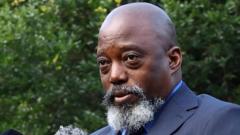The Democratic Republic of Congo's senate has lifted the immunity of ex-President Joseph Kabila, allowing treason charges linked to his alleged support for rebel groups, particularly the M23. This controversial decision comes as the country grapples with ongoing instability, amidst claims of external influences and internal political strife.
Congo's Senate Revokes Kabila's Immunity in High-Stakes Treason Case

Congo's Senate Revokes Kabila's Immunity in High-Stakes Treason Case
Former president Joseph Kabila faces prosecution over allegations of collaborating with armed rebels in the eastern region of DR Congo.
The Democratic Republic of Congo's (DRC) senate has made a pivotal move by stripping former President Joseph Kabila of his legal immunity, facilitating potential treason charges against him. The allegations, which implicate Kabila in supporting armed groups—specifically the M23 rebels—stem from a significant accumulation of documents, testimonies, and facts suggesting his involvement in destabilizing activities in the country's mineral-rich eastern territories.
In a decisive vote held on Thursday, nearly 90 senators endorsed the prosecution while only five opposed it, prompting Senate Speaker Jean-Michel Sama Lukonde to announce the authorization for Kabila's prosecution. Notably, Kabila did not attend the senate hearing to address the accusations, a factor that raises questions about his defense strategy.
Kabila, now 53, has previously denied any affiliation with the M23 insurgents, who have seized control of multiple towns over the years. Following the end of his presidency in 2019, he was granted the title of "senator for life," granting him legal immunity which has now been lifted upon request by the DRC's military prosecutor.
The former leader has spent the last two years residing in South Africa but recently expressed intentions to return to the DRC to seek resolutions to ongoing conflicts in the eastern region. Following rumors of his return to Goma—one of the cities currently held by the M23—his political party, the People's Party for Reconstruction and Democracy (PPRD), quickly dispelled these claims.
The DRC's government took further action against Kabila by ordering the seizure of his assets. Justice Minister Mutamba stated he should return to the DRC and confront the charges against him. The risk of Kabila facing trial could provoke further unrest in a nation already grappling with the long-standing M23 rebellion since 2012.
Critics, including Kabila's party, argue that this prosecution is merely a distraction from larger issues plaguing the DRC. Despite past collaborations with the current President Félix Tshisekedi, Kabila's influence within the political landscape remains substantial, posing questions about the stability of Tshisekedi's administration.
The backdrop of these legal proceedings is marked by ongoing conflict, with the M23 insurgents seeking to extend their grip on eastern territories, displacing hundreds of thousands of civilians. Recent diplomatic attempts at peace negotiations between the DRC and neighboring Rwanda—accused of providing support to the M23—could play a crucial role in the resolution of this crisis, as both nations agreed on a preliminary peace framework in Washington last month.
As the situation develops, the implications of Kabila's prosecution may significantly impact the political dynamics and peace efforts within the DRC.


















